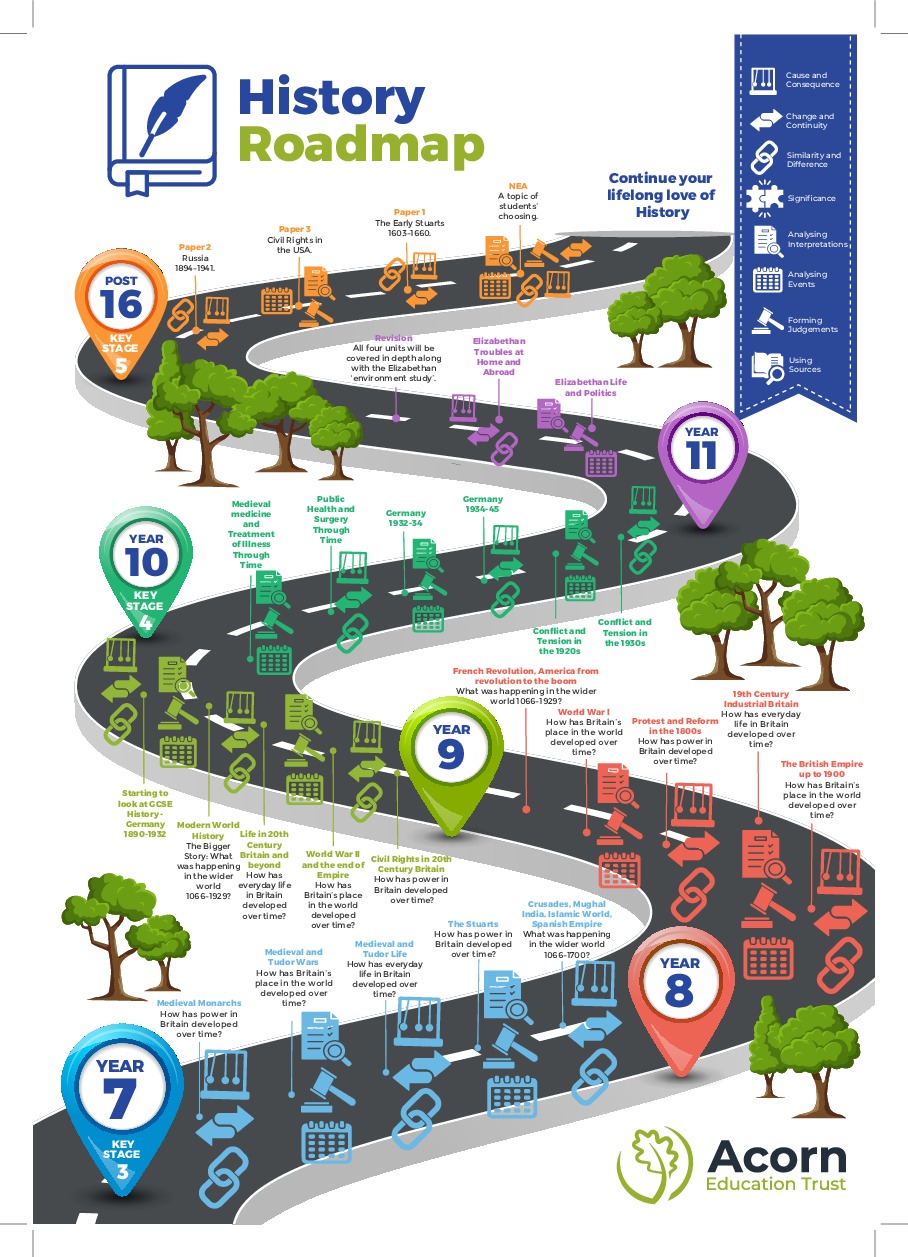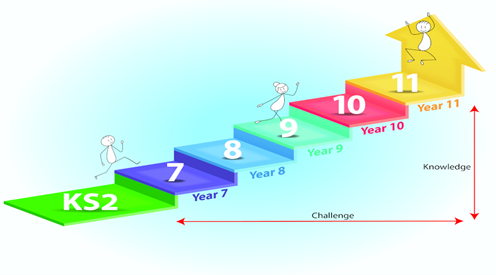History
Moving from Primary to Secondary
Students will have had a variety of experiences in History at Key Stage 2, but should have studied life in Britain before 1066 so we begin at this point, whilst spending our first lessons and homework recapping this previous learning. Students should have covered the second order concepts of cause and consequence, change and continuity, similarity and difference and significance at Key Stage 2 as well as the principles of historical sources and interpretations so we address these explicitly in early lessons and from here focus all of our lessons around them.
Creating Subject Experts
Helping our learners become great Historians.
Our curriculum is taught broadly chronologically from the period 1066-present and whilst a major focus is on British history, including elements of local history, it covers a mixture of topics from world history, so that students develop their identity as both British and global citizens and so that they understand where the history of Britain fits in to the wider world. We teach the subject through three narratives – “Big Stories” which build an understanding of development and change through time and forge links between the different events, issues, places and people we study. These Big Stories tell the stories of:
- Power: How has the way Britain has been ruled over time changed?
- Life: How has life in Britain changed over time?
- Britain & The World: How has Britain’s place in the world changed over time?
In addition, we cover aspects of international history to address the question “What are the key developments in world history that we need to know about in Britain?” This allows us to make comparisons and links between the national and international picture and deepen understanding of the three Big Stories through this context.
Subject Disciplines (Skills)
We have designed a curriculum which focuses on four key skills and four key concepts (disciplinary knowledge.) We link these four skills to jobs and will refer to them as the Four Jobs, to provide an easy point of reference throughout the course:
- Understanding and explaining interpretations of history (“We are builders…”)
- Understanding and explaining historical events and issues (We are reporters…)
- Analysing and evaluating events, issues and interpretations to form judgements (We are judges…)
- Interrogating and using sources of evidence (We are detectives…)
Each lesson then also has a conceptual focus based on a second order concept, as outlined in the National Curriculum for History. They are:
- Cause and consequence
- Change and continuity
- Similarity and difference (between places and people in the same time period)
- Significance
Ultimately therefore, each lesson would expect students to do one of the four jobs whilst focusing on a second order concept – for example by explaining interpretations of the causes of World War I, or making judgements about the significance of the Magna Carta, or using sources to identify similarities and differences across the British Empire, or explaining changes in Industrial Britain between 1750 and 1900.
Our Progression Documents clearly set our what progression looks like in these disciplines throughout Key Stage 3 as students move on this continuum:
- From identifying and stating differences in interpretation and the reasons for differences, examples of change/continuity/cause/consequence/significance, judgements and key points in sources
- To describing and explaining
To giving sophisticated explanations which make links and articulate the complexity of the issues and events
Subject Substantives (Knowledge)
Underpinning all of this is substantive knowledge – the names, dates, places, terms etc. which empower students to write with confidence and credibility. We intend to place substantive knowledge at the centre of our curriculum, in particular by identifying essential content (including key vocabulary) and through interleaving tasks across each unit and the whole curriculum plan. This knowledge is outlined in the road map below.
By the end of Key Stage 3 students should have a deep understanding of:
- How power has changed in Britain through time, from a hierarchical system dominated by the monarchy and influenced strongly by religion through to a democratic system with power lying with Parliament.
- How life has changed through time from a feudal system and largely rural society influenced largely by superstition and religious beliefs and limited by the constraints of scientific and technological knowledge through to today’s globalised society transformed by our understanding of science and technology whilst facing new challenges and opportunities as a result of this and changing beliefs and attitudes.
- How Britain increasingly grew in status from 1066 onwards, reaching a peak at the time of empire and in a position to be on the victorious side in both world wars, why this status has declined in the last century.
- How developments and turning points in different nations and civilisations have had direct and indirect influences and impacts on Britain and vice versa and how global history over the last 1000 years informs the world we live in today.
Roadmap

How we assess your child
Assessment Grades KS3
Students complete assessments in each of their subjects at key points during the year which test their understanding of all the knowledge they have learnt to date (we call these cumulative assessments). We grade these assessments on a scale from 1-9 (9 being the highest). The assessments are designed so that each year they become more challenging and test students on their growing bank of knowledge.
Therefore, as an example, if your child achieves a grade 5 in an assessment in Year 7, we can predict confidently that they should go on and achieve at least a grade 5 at GCSE. This is providing they keep working hard and progressing. Please note: this prediction states “at least”. Students often achieve higher than this.
In years 7 – 9, in practical subjects (PE, Drama, Music etc.), we assess students on their practical ability and skills. This gives us a strong indication of how successful they would be if they chose one of these subjects as a GCSE option. However, in order to get a fuller view of their potential success, it is also important to consider their grades in the core subjects. This is because there is often a literacy, numeracy, or scientific element to the courses.

Assessment Grades in KS4
Students complete mock exams in each of their subjects at key points during the year which test their understanding of all the knowledge they have learnt to date. We grade these mock exams on a scale from 1-9 (9 being the highest). In the report you will see:-
- Target Grade: This is based on a student’s past performance. It is an aspirational but achievable target
- Mock Grade: The grade they achieved in the mock exam
- Predicted Grade: The grade a teacher believes a student will achieve in the final exam, if they maintain their current ATL and performance
Assessment Grades in KS5
Students complete mock exams in each of their subjects at key points during the year which test their understanding of all the knowledge they have learnt to date. We grade these mock exams on a scale from A*-E/Distinction* - Pass. In the report you will see:-
- Target Grade: This is based on a student’s past performance. It is an aspirational but achievable target
- Mock Grade: The grade they achieved in the mock exam
- Predicted Grade: The grade a teacher believes a student will achieve in the final exam, if they maintain their current ATL and performance
Exam Board Information
In Key Stage 4 we study the AQA GCSE in History.
The syllabus is based on 4 units:
- A period study (Germany 1890-1945)
- A wider world study (Conflict and Tension 1919-39)
- A development study (Health and the People 1000-present)
- A British depth study (Elizabethan England)
Students take two exam papers of two hours each. Paper 1 is based on the period and wider world studies, whilst Paper 2 is based on the development British depth studies.
Every unit is worth 25% of the overall GCSE, with each paper therefore worth 50%.
Each unit is assessed by a combination of:
- source or interpretations based questions
- short essays based on the second order concepts of cause, consequence, change, continuity, similarity, difference and significance which require an explanation
- longer essays based on similar second order concepts which require a judgement
In Key Stage 5 we study the OCR A-Level in History.
The syllabus is based on 4 units:
- Paper 1 - A British study (The early Stuarts) worth 25% and assessed on an essay and a source task
- Paper 2 - A non-British study (Russia 1894-41) worth 15% and assessed on two essays
- Paper 3 - A thematic study (American Civil Rights) worth 40% and assessed on an interpretations task and essays
- A personal study (NEA)worth 20% based on a research based essay using sources and interpretations



